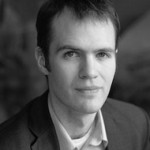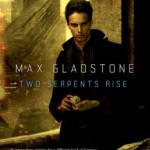This is the second part of my interview with Max Gladstone, the author of Three Parts Dead. You can read part one of the Q&A here, and stay tuned for the review of his newest novel Two Serpents Rise tomorrow.
In Three Parts Dead, you reframed parts of our complicated financial system through a theological lens. Is there any theological practice that your think the financial world should steal? Are there any places where the financial world has appropriated priestly qualities without perhaps-necessary traditional, ritual, or cultural safeguards?
Paul Tillich wrote that faith was the state of being ultimately concerned: of one’s entire being revolving around a single concept. But if that concept is not itself ultimate, then making it the subject of ultimate concern results in a disordered personality, like a top spun off-center.
It seems to me that our financial system is ultimately concerned with ideas that are themselves not ultimate. The singleminded pursuit of short-term growth (serve the shareholders! make money! protect our percentage!) can lead us down paths that defeat more ultimate goals (keep the economy healthy! protect the world from depression!). I doubt this could be solved without a wholesale psychological realignment, though—it’s the province of education.
One way a religious approach really could help the modern financial world would be to adopt the traditional Hindu ages of man. Regulation is a big problem in the financial world right now, because finance is so fussy and complicated that only economists and financiers can manage it, but many of these have clear conflicts of interest. When a person jumps from a ‘poorly-paid’ SEC position to a seven-figure Wall Street job and back, where do her loyalties really lie?
I’ve heard that traditional Hindu culture separates life into four stages: as a child, learn. As a youth, conquer. In maturity, consolidate. And then, in old age, put aside worldly things & devote oneself to spiritual development, for one’s own sake and the community’s. Imagine a cultural norm where people left private enterprise for the SEC or similar regulatory industries in a one-way manner, to devote themselves to the preservation of the community. Something a little like this happens now—Hank Paulson used to be the CEO of Goldman Sachs after all—but to really work it would have to be a more profound shift, like entering a monastery. Ending your previous life and all associations with it, and embracing your new role as protector and priest.
Plus, how awesome would it be if the Department of Treasury all went around dressed up like monks? Which, I suppose, would make the Secret Service Templars, or Hospitaliers…
I like the Alan Perlis quote about never learning a programming language if it doesn’t change the way you think. What are some books/plays/etc that have changed the way you think?
“How to Serve Man” introduced me to new and innovative culinary technique! But seriously, I hope every book I read will change (or expand) my worldview a little. Some succeed more than others. Fiction and plays change me on a deep level, in ways that often don’t surface for weeks or months afterward; books like the Lymond Chronicles or Lord of Light or Little, Big or The Hero and the Crown transformed the way I write and think in ways that have taken me years to realize and would probably take therapy to really plumb the depths. With scholarship, at least for me, the experience tends to be more dramatic. A good scholarly work presents a whole new lens through which to see reality—or a seed crystal onto which a bunch of other free-floating insights instantly glom. So when you ask this question, my thoughts jump immediately to works of theory:
-
Paul Tillich, The Dynamics of Faith—If everyone in the universe would just read Tillich’s examination of what faith is and means, we’d be spare an endless number of arguments in which people speak passionately and blindly about religion. Understanding faith as a state of being ultimately concerned—faith as a state of being in general, rather than a set of truth claims—was a gateway and a transformation for me.
-
Rudolph Bultmann, “The New Testament and Mythology”—Bultmann’s brief, intense essay is a tuning fork humming at the resonant frequency of naive theology.
-
David Graeber, Debt: the First 5000 Years—Graeber’s work is an anthropologist’s investigation into the origins (and often the theology and myth) of money and debt down human history across a wide variety of cultures. If you swallowed the Econ 101 line about how cash money comes about due to natural inefficiencies in barter systems, you really need to read this book. I kept wanting Graeber to tie the whole story together into a greater thesis, but whatever—as a survey alone it’s more than worth the price of admission, and anyway, it features witches and bloodthirsty zombies!
-
Michael Taussig, The Devil and Commodity Fetishism in South America—chewy anthropology and history with a creamy center of enlightenment. Taussig analyzes the way that Western capitalist world-systems, when brought to rural communities in South America, became linked in local minds with necromancy and demon-worship. I came up with the idea for Three Parts Dead and the Craft Sequence generally before I read Taussig, and wrote Three Parts Dead first, which made discovering and reading this book plain eerie.
- James C. Scott, Seeing Like a State—Wendell Berry with a theoretical framework! I’ve been blissing out on Scott recently, as I ponder the dangers of confusing the map for the territory, and ignoring lived human knowledge.
And stay tuned tomorrow for my review of Two Serpents Rise.











